Old World review

What is it? A turn-based 4X that's part Civ, part Crusader Kings.
Expect to pay: £32/$40
Release: July 1, 2021
Developer: Mohawk Games
Publisher: Mohawk Games
Reviewed on: GTX 1080 Ti, Intel i7-8086K, 16GB RAM
Multiplayer? Yes
Link: Official site
The story of my first campaign in Old World, where I led my Greek civilisation to global domination, is equally the story of Rome, my greatest nemesis in this sprawling turn-based 4X. When I first encountered the Romans, they were extremely friendly, offering us gifts and hospitality, but it was a poisoned chalice—quite literally. A sickness spread, and Roman gestures of friendship were the source. I demanded justice and compensation; Rome only wanted war. It would take nearly 200 years until I got my revenge.
It was not a single continuous war. The first conflict ended without much resolution, with the distance between our empires and the massive mountain chain that separated us creating some logistical difficulties. There were still battles, certainly, costing both of us more than faceless soldiers. Family members, revered generals and close friends also lost their lives. And between the wars were heated diplomatic meetings and more than a little bit of espionage, which again cost lives.
I'll never forgive myself for sending my good pal Confucious, the Chinese philosopher, to infiltrate Roma, where he spent a couple of years before he was murdered. On more than one occasion, I even sacrificed my heirs to the eternal grudge. It's rather fitting that, after all that loss and rage, the fall of the Roman Empire also marked my victory over Old World itself. But I'm getting ahead of myself.
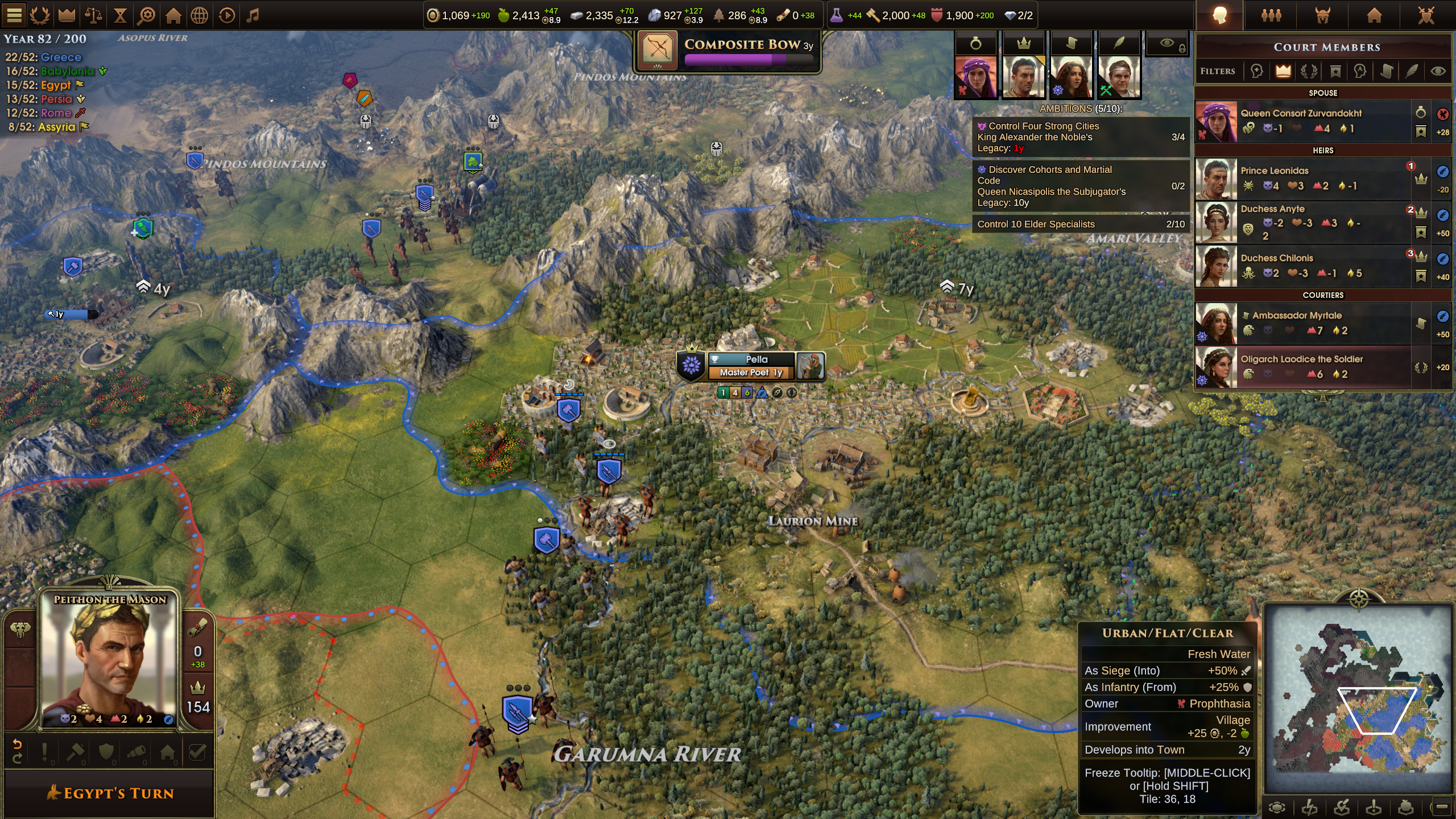
Despite using the language of Civilization—from workers to wonders— it should be starting to become clear that Soren Johnson and Mohawk Games' take on the historical 4X formula is quite different to Firaxis's approach. You still build cities, conquer other ones, develop the tiles around them, and along the way determine the cultural and scientific destiny of your civilisation. So there are plenty of important similarities, which should not be a surprise given that Johnson was also the lead designer of Civilization 4, but Old World feels like a meaningful evolution. And an extremely welcome one.
Something old, something new
The most notable advancement is undoubtedly the importance placed on people. Like Crusader Kings, you are not an immortal ruler leading your people from the birth of civilisation all the way to the space race and beyond. Instead, your famous starting ruler will eventually die. When Philip II left this mortal coil, the empire passed to his son, Alexander, who'd become known as Alexander the Noble—sadly he didn't do enough to earn the 'Great' moniker—who then left it to his daughter, 40 years later. You've got heirs and succession laws to worry about, as well as a court full of potential friends and enemies.
As the name suggests, Old World sticks to antiquity, slowing down Civilization's pace to allow characters to make an impression. It would be pretty tough to do that if every turn moved things forward by decades. Your friends and enemies will be hanging around for a long time, as long as something untoward doesn't happen to them.
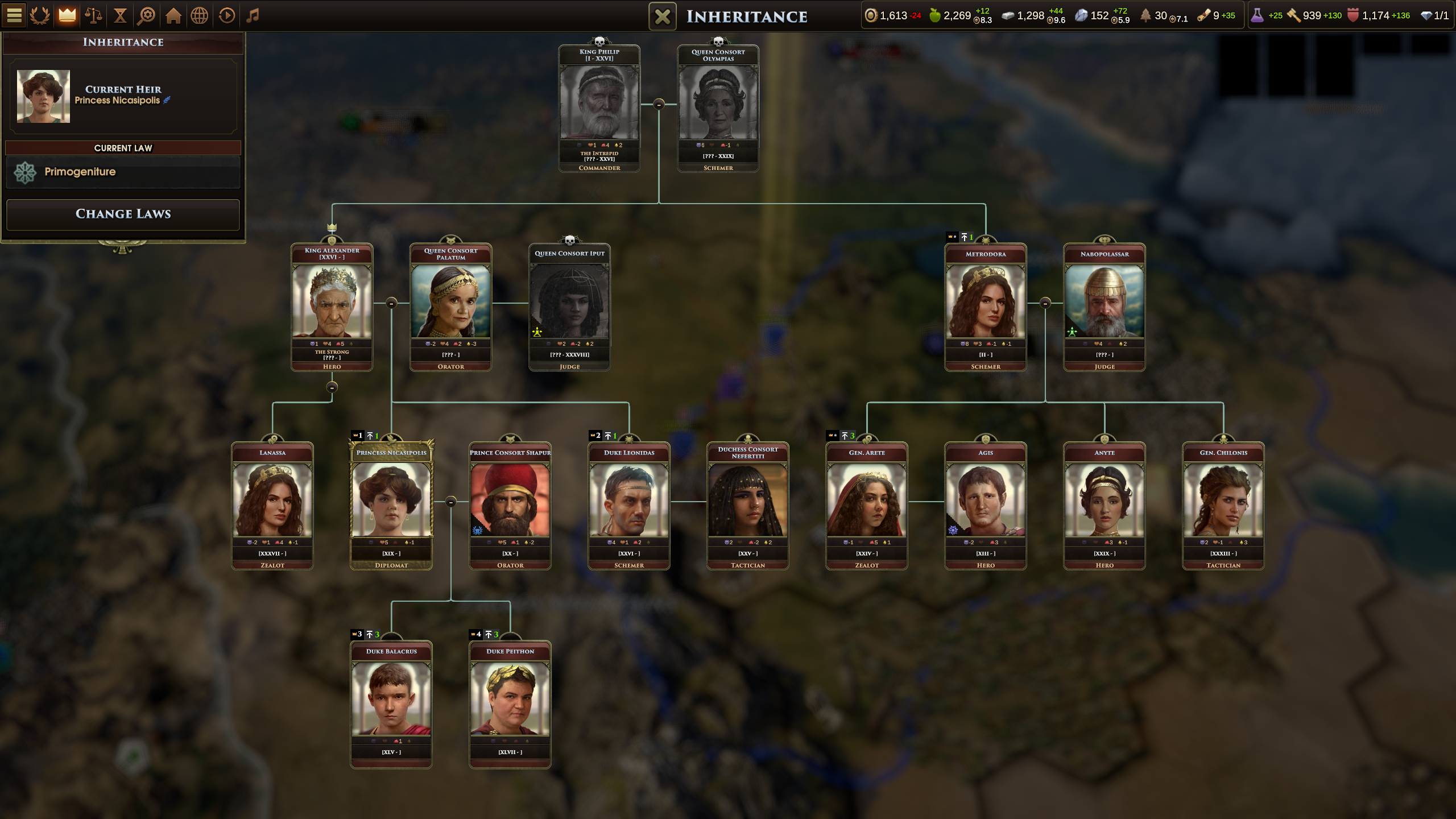
These courtiers, generals and other important folk grow and react, increasing their attributes to become more charismatic or disciplined while also picking up traits like 'wanton' and 'schemer'. They have affairs, illegitimate children, and can plot the demise of other characters, including the ruler. In the mid-game, I found myself playing a particularly talented king, beloved by his people and the triumvirate of influential families constantly vying for power and attention. His uncle, however, was decidedly not a fan. Years before, when I was playing as his father, I encouraged certain unpleasant traits in my son, which benefited me at the time. I had no idea I was creating a nephew-killer. When it came time to reap what I'd sowed, I had some regrets.
Much of this plays out through engaging event pop-ups, typically giving you multiple options that depend on your traits and resources. You get to decide how children are educated, how you react to a diplomatic insult or what to do with the possibly magical sword that was just dug up—I opted for starting a cult and charging them admission to see the fancy blade. Often, you won't see the impact for years, so there's always a surprise around the corner.
When it came time to reap what I'd sowed, I had some regrets.
This all contributes to a sense that you are truly shaping your own civilisation, and in ways that go beyond changing some stats. Slavery, for instance, crops up in both Old World and Civilization, but how it impacts both games is quite different. In Civ 4, for instance, it lets you sacrifice part of your population to rush a construction project. In Old World, however, it becomes a topic that's up for debate. You might find that your people have come to their senses and want to abolish it, encouraging you to toss out the grotesque institution.
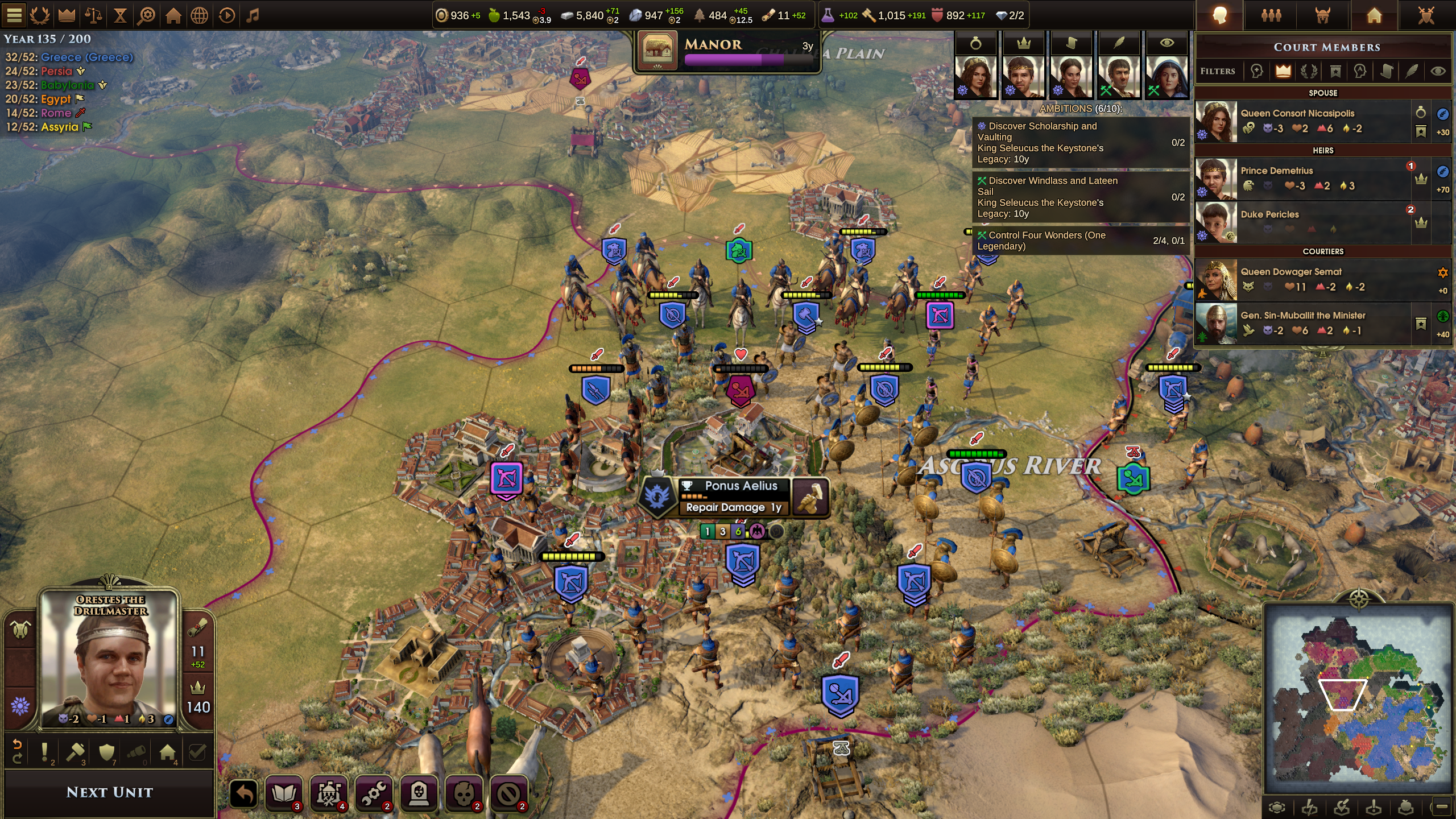
If only the UI did a good job of keeping track of this stuff. It can be jarring to go from the flavourful event text to the abstract, soulless numbers that the UI boils them down to. It's overwhelming, and it's just not that informative. Every interaction is made a little worse because it necessitates faffing around in discrete, counterintuitive menus that drag you all over the screen. Even after winning my first campaign, I still found myself getting occasionally lost, and I still don't know how to find crucial information on things like the spread of religion. The tutorial and encyclopaedia are also little help, choosing brevity and vagueness over clear instructions. There's so much more context and clarity in the event text, so I wish Old World's writers were a bit more involved in designing the interface, which could definitely benefit from their skills.
Alone, the events and characters would have been enough to grab my attention. Civilization and Crusader Kings are two of the greats, and combining their philosophies leads to a game that feels tailor made to my interests. But Old World is filled with new ideas and ways of doing things, dramatically changing how you forge a lasting empire.
Every unit has a specific movement range and room for one action per turn, but without Orders they can't do anything. Orders are a resource that you spend on giving units and characters—like your ambassador or spymaster—commands. Move here. Attack this loser. Steal research from this dork. As you start expanding and fielding more troops, workers and missionaries, you'll find yourself having to prioritise where to spend Orders each turn so that you don't find your tank is empty right when you're about to make a critical move. It's a strategic complication, but sometimes it can actually take the pressure off you. The system teaches you that it's OK to not take action this turn. You don't need to do everything in one go—you've got 200 years to kill.
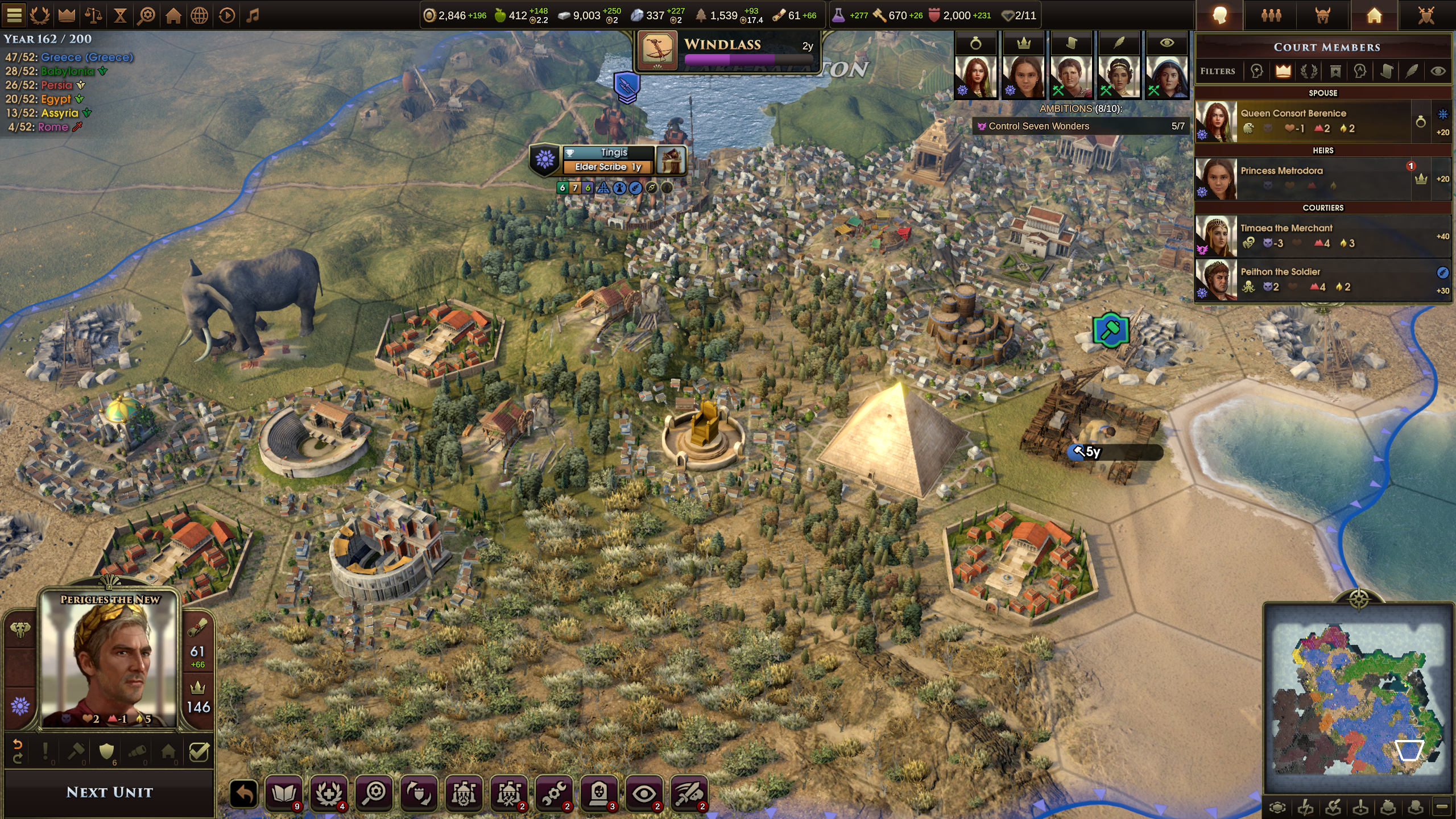
Orders are tied to Legitimacy, with a higher Legitimacy generating more Orders per turn. It's another abstract resource, spawning yet another wrinkle. See, you improve the legitimacy of your reign by generally being insular, promoting national unity and the people of your chosen Civilization above all else. Often, this means you have to treat foreigners with suspicion and take a 'strong' stance that will make the rest of the world rightly think you're a dickhead. It reflects how real leaders sometimes fan the flames of national fervour and encourage small-minded attitudes.
You can, thankfully, still be an extremely effective ruler without pandering to the worst aspects of national identity. Some buildings—which, I should add, are constructed by workers rather than from the city menu, letting you embark on several construction projects at the same time—generate small amounts of Legitimacy that, over time, can give you a significant boost. That's something Old World excels at: always giving you more ways to achieve your objectives. Resource management is another example. On top of the abstract stuff, there's also more tangible resources like stone, iron, wood and gold, which are required for trade and, more importantly, construction. It's a hungry game that demands a healthy stockpile. If you're running low, however, you can simply spend gold to buy more; if you're out of gold, you can also sell whatever resource is abundant.
Friends with benefits
When your larder is looking a little sparse, you can also seek help from your fellow rulers. The focus on people benefits the diplomacy system immensely, as these are personal relationships that you're developing. Friendships with foreign leaders can be completely undone by the way an event plays out, but as always there are plenty of opportunities to repair the damage. More so in the late game, however, once you've unlocked the ability to employ an ambassador. Or you can just use espionage to steal from them. Sometimes the prerequisites do feel a bit restrictive, though, like alliances only being possible if you've got a diplomatically inclined leader.
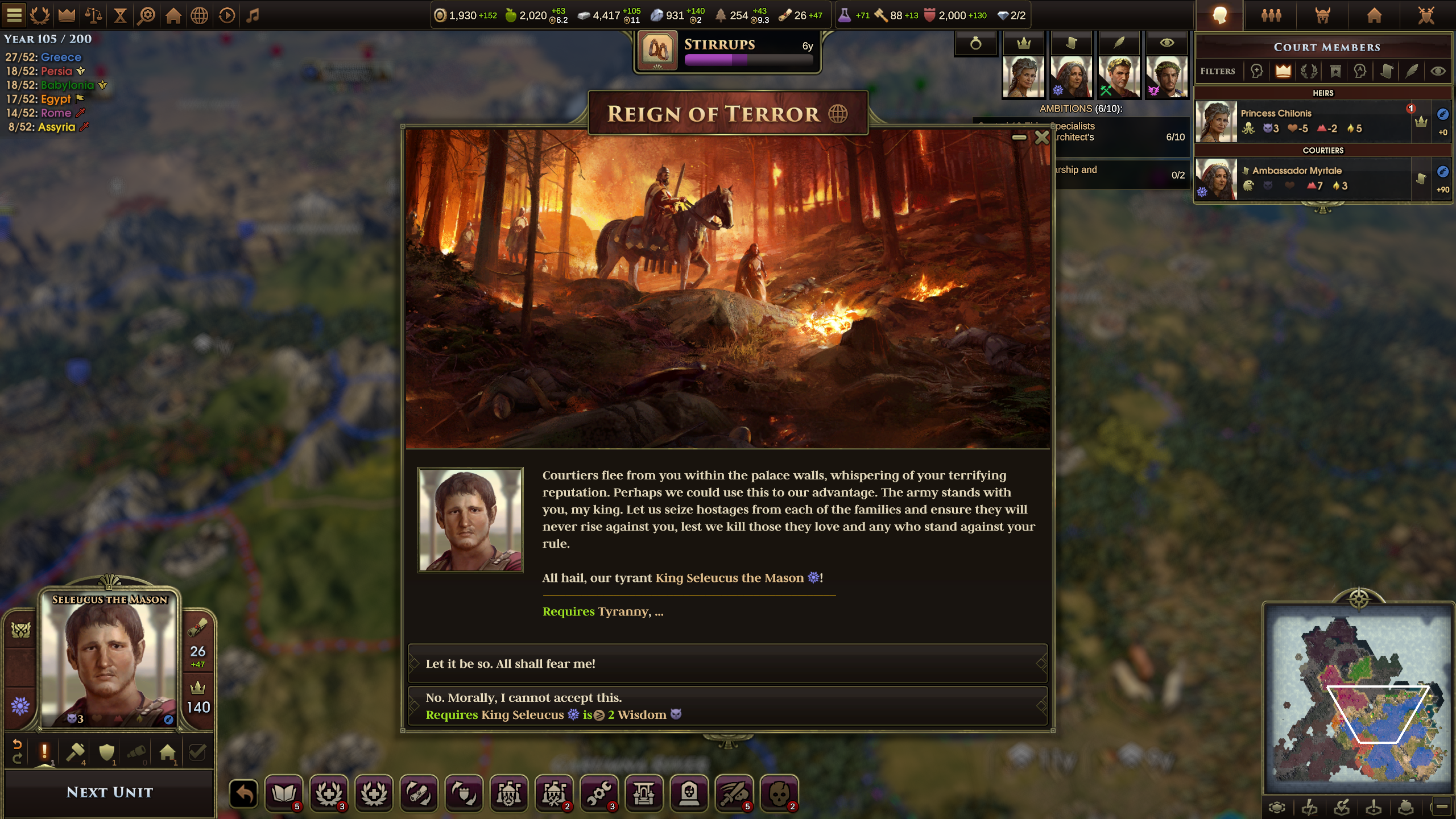
If diplomacy fails, you might find yourself heading to war. Combat is one of the places that feels most evocative of modern Civilization, which is unfortunate, because frankly I'm getting a bit bored of moving all these units around one by one, surrounding cities and slowly battering enemies. That's not to say it hasn't been improved, mind. For one, there's the undo move (or even turn) ability, which is such a blessing. You can undo literally everything in a turn, from declaring war on another nation to moving a unit. You'll never find yourself making unsalvageable mistakes from a misclick or miscalculation. You can also recruit generals from your court, which may have extremely handy abilities, like being able to heal units even in neutral territory.
The AI is generally pretty good, too. A bit too risk averse on the default difficulty, maybe, but also smarter and more reactive. Enemies will retreat to heal up, take advantage of your weaknesses or injured units, and are less likely to be baited into obvious traps. We're not talking tactical geniuses here, but logical, rational enemies are still a boon. Unfortunately, it's still not great at capturing cities. It's just a bit slow and sometimes underprepared, but it gets there eventually.
Throughout my time with Old World I kept coming across things that made me think "Why the heck hasn't Civ done this?" It has solutions to so many 4X niggles that have been around for ages. Take research, for instance. When you choose your next research project, the game produces a few offerings from a deck made up of all the stuff you're ready to discover. So instead of picking from the same list over and over again, it's slightly randomised, and alongside new techs are bonus cards that give you free gifts, like an extra unit or a big pile of resources. If you're in the middle of a war, do you really care about unlocking the magical power of mills? Instead, you can spend a turn or two on getting a free spearman, which will be much more useful in the moment.
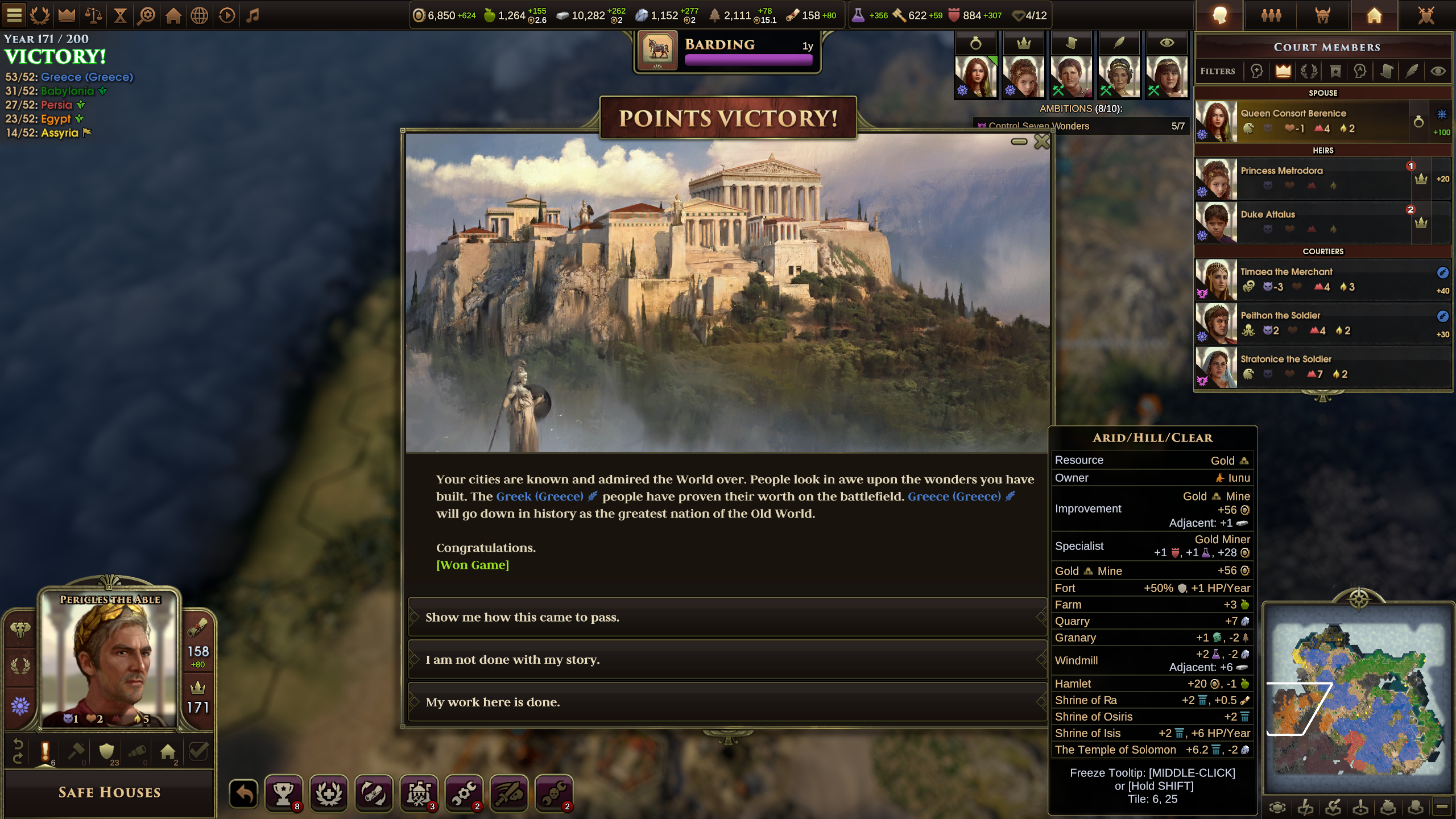
It's a shame it peters out a bit towards the end. The victory conditions, frankly, kinda suck, and mostly go unexplained. The primary method of winning is by earning 52 points before 200 years have passed, which you do by nurturing your cities and building wonders. If nobody gets to 52, the highest wins. You can also get an early win if you double the points of the next nation, but only if you're already halfway to 52. Then there's the Ambition victory, where you win if you manage to complete ten of what are essentially personal goals. If you don't complete them in your life, they become temporary legacy goals that your heir can complete, if they are fast enough. Finally, you can just wipe everyone out. It's all a bit perfunctory, and a lot more gamey than I expected. I was lucky that my first win happened right as I finally conquered my nemesis Rome, because without that it wouldn't have been remotely memorable.
Despite its understated victories, Old World is a brilliant 4X, and one that I'd actually recommend over Civilization at the moment. It feels like a genuine step forward for the genre, boasting so many inventive, smart design decisions. And I can't believe I've reached the end of the review before even mentioning the exceptional soundtrack from composer Christopher Tin. Civ 4's Baba Yetu might still be my favourite of his pieces, but Old World is full of evocative orchestral and choral compositions. There's a lot to love here, and if you've got an itch to conquer the ancient world you absolutely need to give this a shot.